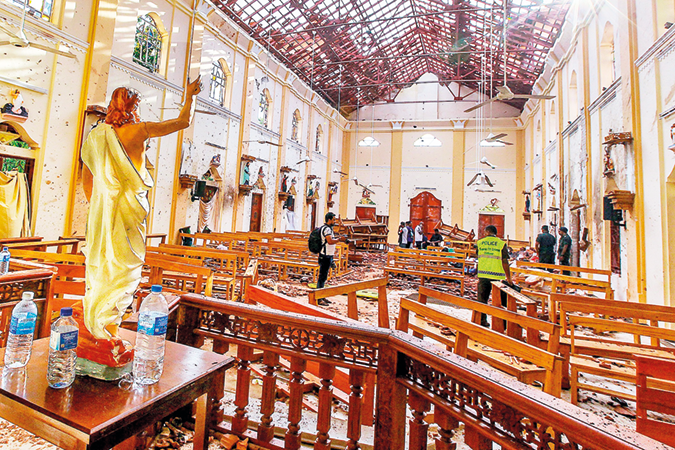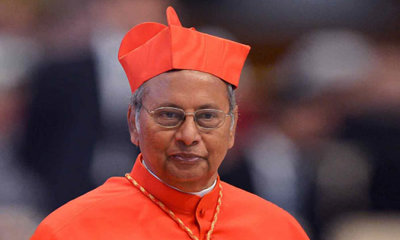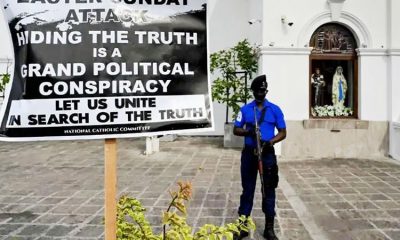Features
The Easter Sunday Attack:‘A Grand Political Plot’

By Kingsley Wickremasuriya, PhD
E-mail: kingsley.wickremasuriya@gmail.com
Introduction
April this year marked the fourt anniversary of the Easter Sunday bomb attack which rocked and shocked Sri Lanka and the world. In retrospect, on the morning of that fateful Easter Sunday, April 21, 2019 suicide bombers targeted three plush hotels and three churches in Colombo, Negombo, and Batticaloa; over 260 were killed and over 500 injured in the well-coordinated near-simultaneous attacks by a group of Islamic extremists called the National Thawheek Jamaat allegedly subscribing to Islamic ideology of JIHAD associated with group with suspected foreign links, that has previously targeted and
Two of the three churches attacked were Catholic churches. One was St. Anthony’s Church in Kochchikade, Colombo, and the other was St. Sebastian’s Church in Katuwapitiya, Negombo. The third church under attack was the Protestant evangelical Zion Church in Batticaloa. The attacks affected the Catholic Church in Sri Lanka directly as many of the victims were Catholics.
The three hotels targeted were the Shangri-La, Kingsbury, and Cinnamon Grand in Colombo. Several of the victims were foreign nationals. Two other persons connected to the Islamic Jihad Movement were killed in two separate explosions in Dehiwala and Dematagoda. Most of the innocents killed, maimed, and injured were people engaged in morning worship at the churches or guests having breakfast in the hotels.
Shortly afterward, , a propaganda outlet for the Islamic State of Iraq and the Levant (ISIL), claimed that ISIL inspired the attacks. It released a photo and a video showing eight suicide bombers pledging allegiance to ISIL leader . Zahran Hashim of the NTJ was identified as their leader.
On April 6, Public Security Minister Sarath Weerasekara stated at a press conference that the Intelligence Services had identified Naufer Moulavi as the mastermind behind the attacks. The Minister also said that he was then in remand custody. Making a special statement in Parliament on April 10, he confirmed his statement to the press that Naufer Moulavi was the main person behind the Easter Sunday terror attacks. Following these disclosures, the national and international media went to town with the revelation that the Sri Lankan Government Minister had identified Naufer Moulavi as the mastermind behind the attack.
State Defense Minister , however, had said earlier, that initial investigations have revealed that Islamic extremists “carried out the attacks in retaliation for the ,’’ a place far removed from the scene of the explosion here. This has been questioned by New Zealand’s Prime Minister and by other experts, who saw the Easter attacks as planned before the Christchurch incident. Further, the New Zealand security expert Paul Buchanan stated that “Christchurch seems to be a convenient justification for something that was being planned before March 15”.
The Amaq news agency’s statements emphasized that the attacks were against Christians who were at war with the organization but none of them referenced the Christchurch incident. But Sri Lanka was not part of the anti-ISIL coalition and the overwhelming majority of those killed in the bombings were Sri Lankan citizen. Further, according to the Criminal Investigation Department, there was no evidence of ISIL’s direct involvement. It was evident that Tawheed Jamaat has been stockpiling explosives since January 2019. Even though it was claimed that the incident was inspired by ISIL, the available evidence was to the contrary.
Meanwhile, Malcolm Cardinal , the head of Sri Lanka’s Catholic Church, alleged that the massacre wasn’t purely the work of a few Islamic extremists but was part of a grand political plot, and that the attacks were conducted intentionally to win votes. He further alleged that the culprits are still holding high positions in the police and Military Intelligence and that the government has been covering up the investigations to protect the real culprits. Expressing dissatisfaction with the progress of the investigation and alleging intimidation of those who clamor for justice, the cardinal called on the UN to investigate the bombings. Even some prominent Buddhist monks contributed to this theory and alleged that “selfish politicians directed the blind rage of religious extremists to achieve political ends”.
Quoting from the report of the President’s Commission on the attack, chapter and verse, in support of his allegation, His Eminence pointed the finger at the former chief of intelligence, and other top-level officials including the Police, for their failure to prevent the attacks. ‘They knew beforehand from the information they had gathered and also from warnings given by the Indian intelligence services, but they did nothing. The Government seems to have done its best to prevent the arrest of the attackers. There are indications that the authorities wanted the attacks to be carried out, he alleged.
Quoting further excerpts from the Presidential Commission Report and other authentic sources, he said that the available evidence indicates that the Government may have been motivated by electoral gain. While Cardinal was making these allegations, Rev. Father Cyril Gamini, spokesman for the Committee of Catholics pointed out several issues regarding some serious lapses in the investigations in a telecast over ‘You Tube’. He also based his arguments on authentic sources like the proceedings of the Presidential Commission and the Parliamentary Select Committee.
These arguments were buttressed by the Opposition in the Parliament during a parliamentary debate on the appointment of a Select Committee on the attack suggesting that it was the work of a Special Operation of an Intelligence Service. Besides, the fact that the former Attorney – General is on record having said that there is a conspiracy behind the incident goes to add further weight against those who the allegations have been made against.
Call for justice
It is against this backdrop that the Cardinal has been repeatedly demanding justice for the victims and their families for a long time. In March this year, he issued what was termed by the media as an ultimatum to the government. The news story stated that the ‘Archbishop of Colombo Malcolm Cardinal Ranjith yesterday warned that countrywide protests would be held if the Government failed to produce before Courts by April 21, those behind the Easter Sunday attacks. “We urge the Government to investigate the attacks impartially and transparently. At least take action against those named in the Presidential Commission on Easter Sunday attacks before April 21. Otherwise, we will hold a continuous protest,” the Cardinal warned. Going by the turn of events, the Cardinal is not likely to rest until the ‘true masterminds’ behind the carnage are identified and penalized.
Conclusions
The incident reveals serious criminal offenses committed against the State putting its security in jeopardy. The offenses of this nature are punishable under the ‘offences against the state’ specified in chapter VI of the Penal Code. It covers a range of offenses relevant to the incident, including conspiracy, abetting and concealment. These offenses carry punishments from death, or imprisonment of either description, which may be extended to 20 years, and the forfeiture of the offender’s property.
But one has to admit that the offenders can be brought to justice only after a fair and impartial criminal investigation and thereafter arraignment before a court of law after a fair trial in keeping with the Rule of Law. That is what the aggrieved parties have been clamoring for. However, from the material exposed so far it appears that the criminal investigations have been obstructed at several points down the line.
Names of several high-ranking officers in the Police and State Intelligence Services have transpired during the course of the Presidential Commission, Select Committee proceedings, debates in Parliament and elsewhere in the Press and Media. Allegations have been made against them by the Church authorities and the aggrieved parties. But these accusations or allegations have not been processed through the criminal justice system. As far as the country is concerned, they have broken the sacred trust the country placed in them.
Presidential Commissions or Select Committees, will not help to clear the air. They will, whatever the picture their sponsors might try to paint to exculpate them, therefore, remain ’guilty’ in the national conscience. As such if they continue to hold those high positions without being cleared through the criminal justice system their credibility will be at stake. They will be watched by the Nation at every move they make with suspicion that will make them vulnerable in their own commands.
Moreover, the attack has all the characteristics of a Special Operation conducted by an Intelligence organization. But without a proper investigation one cannot prove, who is responsible; whether it is the work of a foreign intelligence service or our own or a combination of both.
It has been said that among the growing arsenals across the world, intelligence is an essential weapon, perhaps the most important, and that intelligence is necessary for democracies to avoid disaster and possibly destruction. In other words, ‘Intelligence Organizations are an inevitable part of modern states as armies, telephones, and postal services or a system of collecting taxes’.
Intelligence Organizations have now come to play an ever-increasingly important role. They are a part of the defense forces of a country. Their task is the defense of the realm as a whole from external and internal threats arising from attempts at espionage and sabotage or from actions of persons and organizations whether directed from within or without the country that may be considered subversive of the state’s security. They not only act as the eyes and ears of governments but also as their policy instruments.
One must therefore, accept that intelligence organizations are a reality in modern National and International life in a world that is no longer ruled by ‘negotiation between gentlemen, but rather by plots, revolutions, conspiracies, assassinations, coups d’états, and general mayhem. As such there is an inherent danger within the system itself.
Firstly, intelligence organizations can misinform their governments by providing false information, because the information has been planted on them by a hostile service through a double agent; a sycophantic Intelligence Organization believes that it should provide information that its Masters want to hear; that it has become a representative of a vested interest; and that the Service is thoroughly incompetent that it invents its information and create a non-existent source to cover up its failure. This danger is increased substantially where the Intelligence Organizations control paramilitary forces. They can be real dangers to their states because they represent or can represent conspiratorial power points
Intelligence services are specially trained to carry out covert operations while on the other hand the main task of the Police is the prevention of crimes and offenses. Therefore, it is unimaginable to find any State Intelligence Service or the Police working in concert with subversives against the grain of their basic responsibilities under the very nose of the State. This is why it is doubly important not to have any doubts left as to who was responsible for the attack and who the mastermind behind was.
The trade of intelligence, therefore, is not everyone’s cup of tea.
Intelligence Organizations, should be highly professional and their management should, be in the hands of men of first-rate ability, imagination, and integrity. In the last analysis, however, the truth is that the intelligence organizations are as competent or incompetent as the governments who control them.
Features
Kashmir terror attack underscores need for South Asian stability and amity

 The most urgent need for the South Asian region right now, in the wake of the cold-blooded killing by gunmen of nearly 30 local tourists in Indian-administered Kashmir two days back, is the initiation of measures that could ensure regional stability and peace. The state actors that matter most in this situation are India and Pakistan and it would be in the best interests of the region for both countries to stringently refrain from succumbing to knee-jerk reactions in the face of any perceived provocations arising from the bloodshed.
The most urgent need for the South Asian region right now, in the wake of the cold-blooded killing by gunmen of nearly 30 local tourists in Indian-administered Kashmir two days back, is the initiation of measures that could ensure regional stability and peace. The state actors that matter most in this situation are India and Pakistan and it would be in the best interests of the region for both countries to stringently refrain from succumbing to knee-jerk reactions in the face of any perceived provocations arising from the bloodshed.
The consequences for the countries concerned and the region could be grave if the terror incident leads to stepped-up friction and hostility between India and Pakistan. Some hardline elements in India, for instance, are on record in the international media as calling on the Indian state to initiate tough military action against Pakistan for the Kashmiri terror in question and a positive response to such urgings could even lead to a new India-Pakistan war.
Those wishing South Asia well are likely to advocate maximum restraint by both states and call for negotiations by them to avert any military stand-offs and conflicts that could prove counter-productive for all quarters concerned. This columnist lends his pen to such advocacy.
Right now in Sri Lanka, nationalistic elements in the country’s South in particular are splitting hairs over an MoU relating to security cooperation Sri Lanka has signed with India. Essentially, the main line of speculation among these sections is that Sri Lanka is coming under the suzerainty of India, so to speak, in the security sphere and would be under its dictates in the handling of its security interests. In the process, these nationalistic sections are giving fresh life to the deep-seated anti-India phobia among sections of the Sri Lankan public. The eventual result will be heightened, irrational hostility towards India among vulnerable, unenlightened Sri Lankans.
Nothing new will be said if the point is made that such irrational fears with respect to India are particularly marked among India’s smaller neighbouring states and their publics. Needless to say, collective fears of this kind only lead to perpetually strained relations between India and her neighbours, resulting in regional disunity, which, of course would not be in South Asia’s best interests.
SAARC is seen as ‘dead’ by some sections in South Asia and its present dysfunctional nature seems to give credence to this belief. Continued friction between India and Pakistan is seen as playing a major role in such inner paralysis and this is, no doubt, the main causative factor in SARRC’s current seeming ineffectiveness.
However, the widespread anti-India phobia referred to needs to be factored in as playing a role in SAARC’s lack of dynamism and ‘life’ as well. If democratic governments go some distance in exorcising such anti-Indianism from their people’s psyches, some progress could be made in restoring SAARC to ‘life’ and the latter could then play a constructive role in defusing India-Pakistan tensions.
It does not follow that if SAARC was ‘alive and well’, security related incidents of the kind that were witnessed in India-administered Kashmir recently would not occur. This is far from being the case, but if SAARC was fully operational, the states concerned would be in possession of the means and channels of resolving the issues that flow from such crises with greater amicability and mutual accommodation.
Accordingly, the South Asian Eight would be acting in their interests by seeking to restore SAARC back to ‘life’. An essential task in this process is the elimination of mutual fear and suspicion among the Eight and the states concerned need to do all that they could to eliminate any fixations and phobias that the countries have in relation to each other.
It does not follow from the foregoing that the SAARC Eight should not broad base their relations and pull back from fostering beneficial ties with extra-regional countries and groupings that have a bearing on their best interests. On the contrary, each SAARC country’s ties need to be wide-ranging and based on the principle that each such state would be a friend to all countries and an enemy of none as long as the latter are well-meaning.
The foregoing sharp focus on SAARC and its fortunes is necessitated by the consideration that the developmental issues in particular facing the region are best resolved by the region itself on the basis of its multiple material and intellectual resources. The grouping should not only be revived but a revisit should also be made to its past programs; particularly those which related to intra-regional conflict resolution. Thus, talking to each other under a new visionary commitment to SAARC collective wellbeing is crucially needed.
On the question of ties with India, it should be perceived by the latter’s smaller neighbours that there is no getting away from the need to foster increasingly closer relations with India, today a number one global power.
This should not amount to these smaller neighbours surrendering their rights and sovereignty to India. Far from it. On the contrary these smaller states should seek to craft mutually beneficial ties with India. It is a question of these small states following a truly Non-aligned foreign policy and using their best diplomatic and political skills to structure their ties with India in a way that would be mutually beneficial. It is up to these neighbours to cultivate the skills needed to meet these major challenges.
Going ahead, it will be in South Asia’s best interests to get SAARC back on its feet once again. If this aim is pursued with visionary zeal and if SAARC amity is sealed once and for all intra-regional friction and enmities could be put to rest. What smaller states should avoid scrupulously is the pitting of extra-regional powers against India and Pakistan in their squabbles with either of the latter. This practice has been pivotal in bringing strife and contention into South Asia and in dividing the region against itself.
Accordingly, the principal challenge facing South Asia is to be imbued once again with the SAARC spirit. The latter spirit’s healing powers need to be made real and enduring. Thus will we have a region truly united in brotherhood and peace.
Features
International schools …in action

 The British School in Colombo celebrated the 2025 Sinhala and Tamil New Year with the traditional rites and rituals and customs unique to the island nation, during a special Avurudu Assembly held at the school premises.
The British School in Colombo celebrated the 2025 Sinhala and Tamil New Year with the traditional rites and rituals and customs unique to the island nation, during a special Avurudu Assembly held at the school premises.
Students from all over the world, who are part of The British School in Colombo, gathered to celebrate this joyous event.
The special assembly featured traditional song and dance items from talented performers of both the Junior and Senior Schools.
On this particular day, the teachers and students were invited to attend school in Sri Lankan national costume and, among the traditional rituals celebrated, was the boiling of the milk and the tradition of Ganu-Denu.

Boiling of
the milk
In the meanwhile, a group of swimmers from Lyceum International School, Wattala, visited Australia to participate in the Global-ISE International Swimming Training Programme in Melbourne.
Over the course of 10 days, the swimmers followed an advanced training schedule and attended sessions at the Melbourne Sports and Aquatic Centre (MSAC), Victoria’s Nunawading Swimming Club, and Camberwell Grammar School.
In addition to their training, the group also explored Melbourne, with visits to key landmarks, such as the Parliament House and the Melbourne Cricket Ground (MCG), along with city tours and cultural experiences.

Traditional dance item

Tug-of-war contest

On arrival in Melbourne, Lyceum International School, Wattala, with Sri Lankan officials
Features
Perfect … and healthy

 Got a few more beauty tips to give you … for a perfect complexion, or, let’s say, a healthy skin.
Got a few more beauty tips to give you … for a perfect complexion, or, let’s say, a healthy skin.
* Honey Face Mask:
Take a tablespoon of raw honey and then warm it up by rubbing it with your fingertips. Apply the warm honey all over your face. Let this natural mask stand for about 10 minutes and then wash it off gently with warm water.
* Coconut Milk Face Mask:
You need to squeeze coconut milk out of a grated raw coconut and apply this milk all over your face, including your lips.
(This will help you gain a glowing skin. It is one of the best natural tips for skin care)
* Orange, Lemon, and Yoghurt Moisturiser:
To prepare this moisturiser, you need a tablespoon of orange juice, a tablespoon of lemon juice and a cup of plain yoghurt.
Mix them together and apply the paste all over your face, leaving it as a mask for 10 to 15 minutes. Next, take a damp handkerchief and use it to clean your face.
(This moisturiser brightens the complexion of your skin)
* Cucumber and Lemon:
Apply equal parts of cucumber and lemon juice on your face before taking a bath. Allow it to sit for 10 minutes before rinsing it off. This natural face beauty tip will brighten your skin tone and lighten blemishes if used on a regular basis. The best aspect is that it is appropriate for all skin types!
* Healthy Diet:
Aside from the effective home remedies, there are certain other factors to consider for skin care – and the first of them is your diet. Without the right nutrients, your skin cannot reverse the damage it suffers every day.
Eat fruits that are high in vitamin C because they contain antioxidants.
Adjust your diet to get the right amount of protein and unsaturated fats, as well as fresh green vegetables. All of this provides the right amount of nutrients so your skin can heal and improve itself naturally.
* Sun Protection and Care:
Another thing to keep in mind is not to step out of your home without sunscreen, especially with this awful heat we are experiencing at the moment. The hard rays of the sun can do you more damage than you could ever imagine.
By the way, you can prepare your own sunscreen lotion with glycerin, cucumber juice and rose water. You can also keep this lotion in the fridge.
-

 Business6 days ago
Business6 days agoDIMO pioneers major fleet expansion with Tata SIGNA Prime Movers for ILM
-

 News4 days ago
News4 days agoFamily discovers rare species thought to be extinct for over a century in home garden
-

 Features6 days ago
Features6 days agoProf. Lal Tennekoon: An illustrious but utterly unpretentious and much -loved academic
-

 Foreign News5 days ago
Foreign News5 days agoChina races robots against humans in Beijing half marathon
-

 Features2 days ago
Features2 days agoRuGoesWild: Taking science into the wild — and into the hearts of Sri Lankans
-

 Editorial5 days ago
Editorial5 days agoSelective use of PTA
-

 News2 days ago
News2 days agoOrders under the provisions of the Prevention of Corruptions Act No. 9 of 2023 for concurrence of parliament
-

 Features4 days ago
Features4 days agoThe ironies of history






















